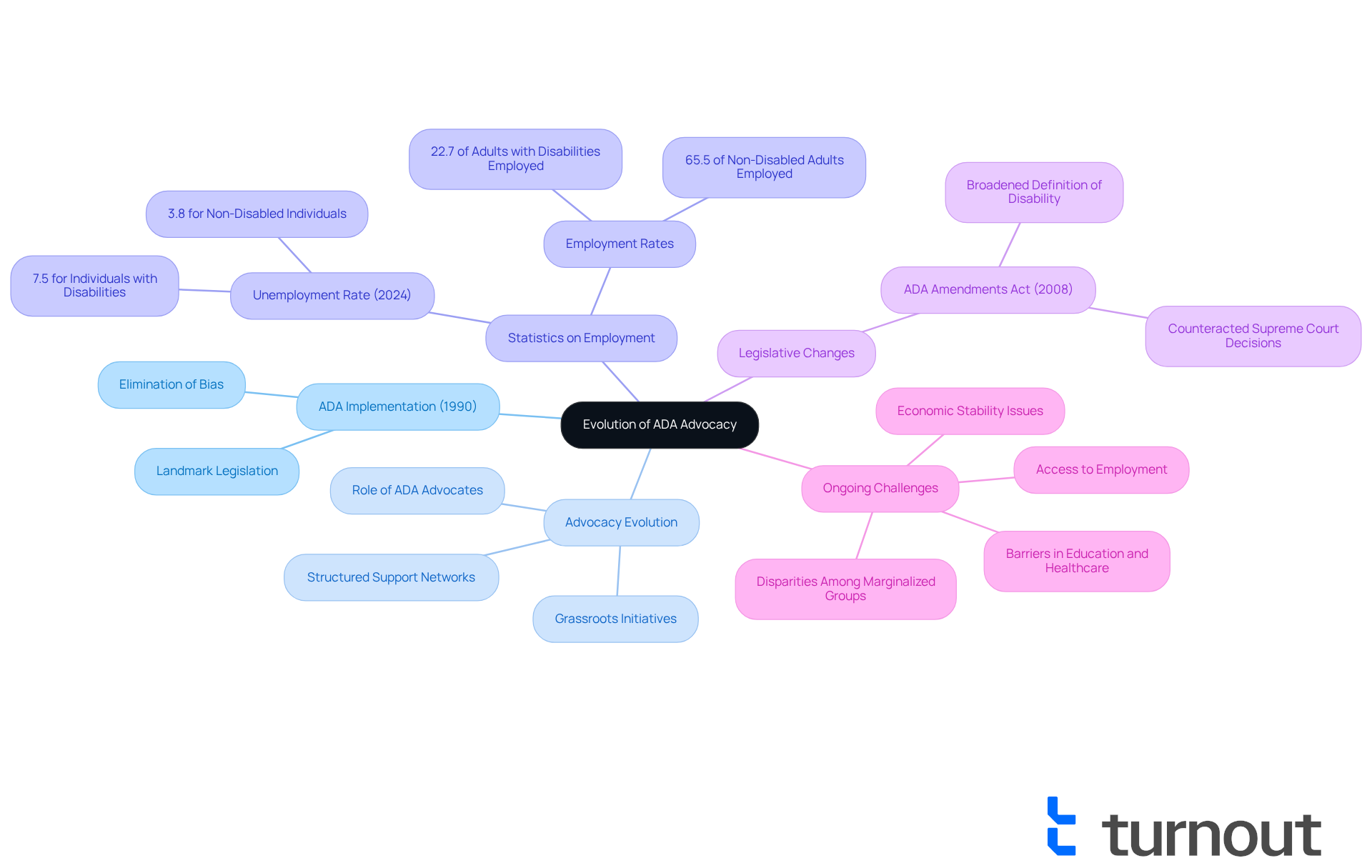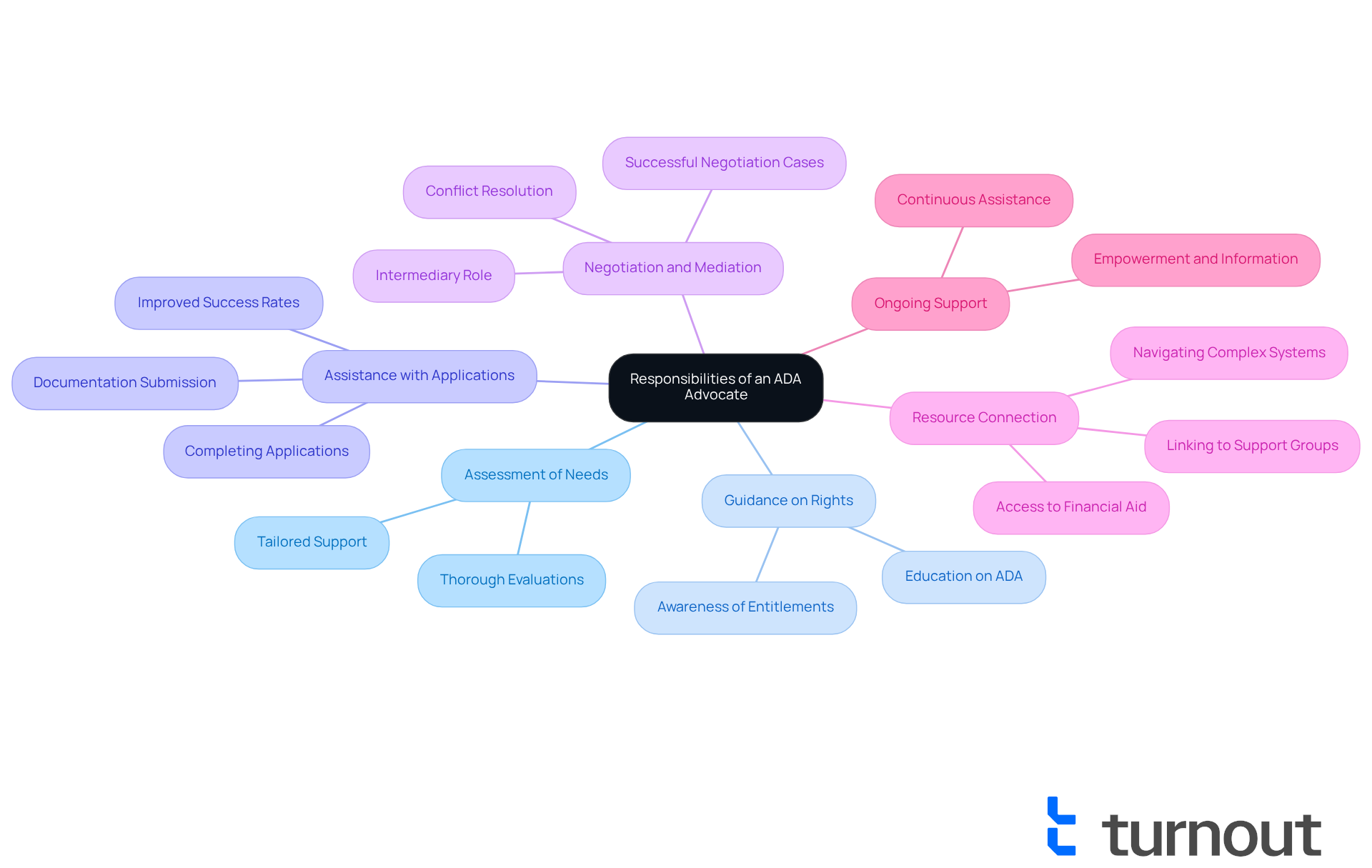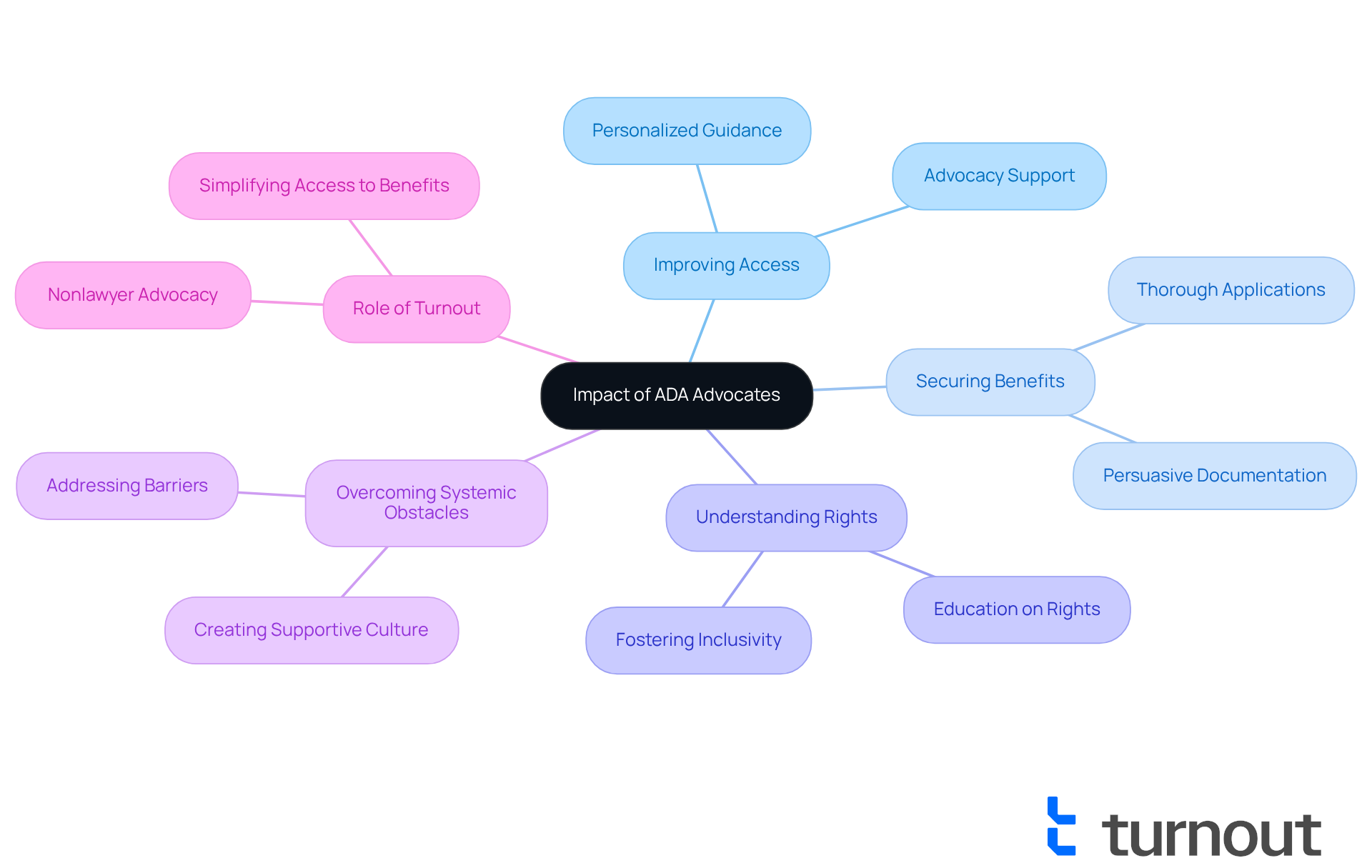Overview
ADA advocates are dedicated professionals who understand the challenges faced by individuals with disabilities. They help you navigate your rights under the Americans with Disabilities Act (ADA) and the often complex process of accessing benefits and accommodations.
We know that seeking assistance can feel overwhelming. That’s where these advocates come in. They provide tailored support and guidance, ensuring you understand your rights and helping you with applications. This personalized approach not only addresses systemic barriers but also fosters a more inclusive society.
Imagine having someone by your side, guiding you through each step. With their help, the likelihood of success increases significantly. You deserve to have your needs met, and these advocates are here to ensure that happens.
If you’re feeling uncertain or alone in this journey, remember: you are not alone. We’re here to help you every step of the way. Together, we can work towards a brighter, more inclusive future.
Introduction
Navigating the complexities of the Americans with Disabilities Act (ADA) can feel overwhelming for many individuals with disabilities. It’s common to feel isolated and unsure of where to turn for help. This is where ADA advocates step in as essential allies, offering the guidance and support needed to understand your rights and access vital resources.
Despite the progress made since the ADA was established, significant barriers and inequalities still exist. This raises an important question: how can ADA advocates effectively dismantle these obstacles? More importantly, how can they empower those they serve to achieve true equality and inclusion?
We understand that the journey can be daunting, but you are not alone in this. Together, we can work towards a more inclusive future. Let’s explore how we can overcome these challenges and foster a community where everyone has the opportunity to thrive.
Define ADA Advocate: Role and Purpose
Navigating the complexities of the Americans with Disabilities Act (ADA) can be overwhelming. We understand that many individuals with impairments face significant challenges in accessing their rights and benefits. That’s where the ADA advocates come in. These dedicated experts are here to help you understand your rights and access the resources available to you.
ADA advocates play a crucial role in guiding individuals through the application process for assistance benefits, advising on workplace adjustments, and advocating for fair treatment in various environments. Research shows that people with disabilities who work with an ADA advocate are much more likely to successfully navigate the ADA and secure the benefits they need. Imagine having someone by your side, helping you overcome obstacles and achieve your goals in a system that can often feel daunting.
At Turnout, we simplify access to government benefits and financial support, including SSD claims. Our trained nonlawyer advocates guide clients through the process without providing legal representation. It’s important to note that Turnout is not a law firm and does not offer legal advice. For tax debt relief, we collaborate with IRS-licensed enrolled agents, ensuring you receive comprehensive support.
As Senator Edward M. Kennedy once said, the ADA is one of the most significant achievements in civil rights legislation. This highlights the ongoing need for advocacy in this area. In this journey, you have the support of an ADA advocate, so you are not alone. We’re here to help you navigate the complexities of the ADA and empower you to fully engage in society. Together, we can work towards a future where everyone’s rights are recognized and upheld.
Historical Context: The Evolution of ADA Advocacy
The implementation of the Americans with Disabilities Act (ADA) in 1990 marked a pivotal moment in the fight for the rights of individuals with disabilities in the United States. This landmark legislation aimed to eliminate bias against persons with impairments across various areas, including employment, public facilities, and transportation. We understand that navigating these complexities can be overwhelming, which is why the role of ADA advocates has emerged to provide essential support. Over the years, advocacy has evolved from grassroots initiatives to more structured support networks, reflecting a growing recognition of the rights of people with impairments.
Despite notable advancements, significant challenges persist. For instance, in 2024, the unemployment rate for individuals with impairments stood at 7.5%, nearly double that of their non-impaired counterparts at 3.8%. Moreover, only 22.7% of adults with impairments were employed, compared to 65.5% of those without impairments. These statistics highlight the persistent inequalities that advocates strive to address, particularly among marginalized populations like Black, Hispanic, and lower-educated workers who face additional hurdles.
Case studies illustrate the progress of rights advocacy for those with disabilities in the U.S. The National Rights Network, for example, supports 57 Protection & Advocacy (P&A) organizations nationwide, enhancing their capacity to promote policy changes and assist individuals in navigating legal challenges. These agencies have been instrumental in tackling systemic barriers, as seen in their efforts to promote fair wages and combat labor market discrimination.
Furthermore, the ADA Amendments Act of 2008 broadened the definition of disability, empowering individuals to assert their rights under the ADA. This legislative change has been crucial in expanding protections for those experiencing discrimination.
The impact of the ADA on advocacy is profound, yet the fight for inclusion and accessibility continues. ADA advocates play a vital role in ensuring adherence to the ADA and support individuals facing obstacles in various aspects of life, such as employment, education, and healthcare. As the landscape of access rights evolves, the need for dedicated advocacy remains essential to achieving true equality and access for all. Remember, you are not alone in this journey; together, we can work towards a more inclusive future.

Responsibilities of an ADA Advocate: Key Functions and Duties
Individuals with disabilities greatly benefit from the support of ADA advocates, and we recognize that navigating this journey can be challenging. Here’s how they can help:
- Assessment of Needs: Advocates conduct thorough evaluations to understand the unique needs of each individual. This tailored support addresses specific challenges, ensuring that no one feels alone in their struggles.
- Guidance on Rights: They educate clients about their rights under the Americans with Disabilities Act (ADA) and related laws. It’s vital for individuals to be fully aware of their entitlements and protections.
- Assistance with Applications: Advocates assist clients in completing applications for disability benefits. They meticulously ensure that all required documentation is submitted accurately and on time. Research shows that people who collaborate with supporters, like those offered by Turnout, have markedly improved success rates in their applications compared to those who manage the process independently. Turnout employs skilled non-legal representatives to assist clients in their SSD claims, significantly improving their likelihood of success.
- Negotiation and Mediation: Acting as intermediaries, representatives negotiate accommodations and resolve conflicts between individuals and organizations. This facilitates smoother interactions and better results. Successful negotiation cases have shown how representatives can effectively mediate between clients and service providers, leading to favorable resolutions.
- Resource Connection: They link clients with essential resources, such as support groups, financial aid programs, and community services. This connection improves the overall support network accessible to persons with disabilities. Turnout also provides access to tools and services that help consumers navigate complex financial and governmental systems, including tax debt relief, further supporting clients in their journey.
- Ongoing Support: Advocates provide continuous assistance throughout the application process. They help clients navigate challenges and ensure they remain informed and empowered. This ongoing support is essential for maintaining momentum in the application process and addressing any emerging issues.
The effectiveness of ADA advocates is highlighted by successful negotiation and mediation cases, where the involvement of an ADA advocate has resulted in positive outcomes for clients. This illustrates the considerable influence they have as an ADA advocate in pursuing benefits for those with disabilities. Moreover, the structural obstacles encountered by people with impairments, including architectural exclusion, emphasize the significance of advocacy in overcoming these intricate barriers. Remember, you are not alone in this journey; we’re here to help.

Impact of ADA Advocates: Enhancing Access and Support for Individuals with Disabilities
The influence of ADA supporters is truly significant. They play a vital role in improving access and assistance for people with disabilities. We understand that navigating complex systems can be overwhelming, but with personalized guidance and advocacy, these supporters help clients secure the benefits and accommodations they need.
For instance, individuals who work alongside ADA supporters are more likely to successfully obtain benefits for their disabilities. Supporters ensure that applications are thorough and persuasive, making a real difference in outcomes. Moreover, they enhance understanding of rights for individuals with disabilities, fostering a more inclusive community.
Their efforts not only empower individuals but also tackle systemic obstacles. This creates a culture of understanding and support for those with disabilities. In this context, Turnout amplifies the work of ADA advocates by providing tools and services that simplify access to government benefits, particularly for SSD claims.
It's important to note that Turnout is not a law firm and has no affiliation with any law firm or government agency. With trained nonlawyer advocates and IRS-licensed enrolled agents, Turnout provides essential support without the need for legal representation. This ensures that individuals can effectively navigate the complexities of financial assistance and government processes. Remember, you are not alone in this journey; we're here to help.

Conclusion
Navigating the complexities of the Americans with Disabilities Act (ADA) can feel overwhelming for many individuals with disabilities. We understand that this journey can be challenging, and that’s where ADA advocates come in as essential allies. They provide the support and guidance needed to help individuals understand their rights and access the resources available to them. Their role extends beyond just assisting with benefit applications; they advocate for fair treatment and necessary accommodations in various environments.
Throughout this article, we’ve highlighted the significant impact of ADA advocates. They assess individual needs, educate clients about their rights, assist with applications, negotiate on behalf of clients, and connect them with vital resources. The statistics presented underscore the ongoing challenges faced by individuals with disabilities, emphasizing the importance of advocacy in overcoming systemic barriers. Moreover, the historical context illustrates how advocacy has evolved, reflecting a growing recognition of the rights of people with disabilities and the continuing need for dedicated support.
The journey toward true equality and accessibility is ongoing, and the role of ADA advocates remains critical. Their work not only empowers individuals but also fosters a more inclusive society. By collaborating with advocates, individuals can gain the confidence and support needed to navigate complex systems and assert their rights. Embracing this advocacy is a step toward a future where everyone, regardless of ability, can fully engage in society and access the opportunities they deserve. Remember, you are not alone in this journey; we’re here to help.
Frequently Asked Questions
What is the role of an ADA advocate?
An ADA advocate helps individuals understand their rights under the Americans with Disabilities Act (ADA), guides them through the application process for assistance benefits, advises on workplace adjustments, and advocates for fair treatment in various environments.
How can ADA advocates assist individuals with disabilities?
ADA advocates assist individuals by providing guidance on navigating the ADA, helping them access resources, and increasing their chances of securing necessary benefits. Research indicates that individuals who work with an ADA advocate are more likely to successfully navigate the ADA.
What services does Turnout provide regarding ADA advocacy?
Turnout simplifies access to government benefits and financial support, including Social Security Disability (SSD) claims, through trained nonlawyer advocates who guide clients without providing legal representation.
Does Turnout offer legal advice?
No, Turnout is not a law firm and does not provide legal advice. They focus on advocacy and guidance related to ADA and benefit applications.
Who collaborates with Turnout for tax debt relief?
For tax debt relief, Turnout collaborates with IRS-licensed enrolled agents to ensure clients receive comprehensive support.
Why is advocacy for the ADA important?
Advocacy for the ADA is important because it helps uphold the rights of individuals with disabilities, ensuring they can fully engage in society and access necessary resources and benefits.




